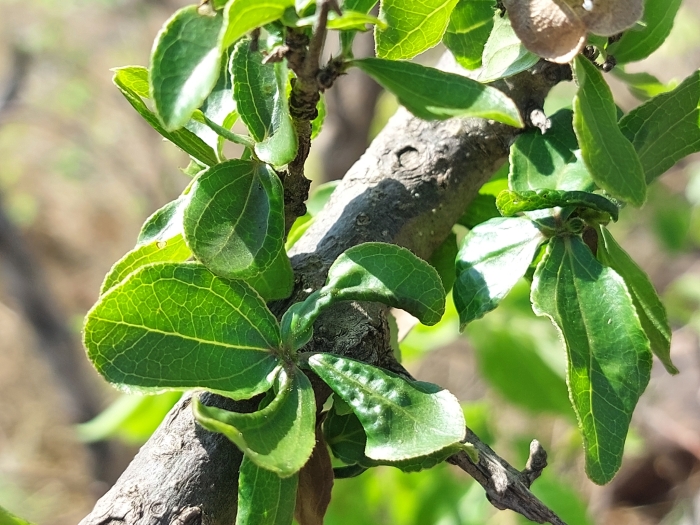Black Monkey Orange
(Strychnos madagascariensis)
Black Monkey Orange (Strychnos madagascariensis)
/
/

Manuel R Popp
CC BY 4.0
Image By:
Manuel R Popp
Recorded By:
Copyright:
CC BY 4.0
Copyright Notice:
Photo by: Manuel R Popp | License Type: CC BY 4.0 | License URL: http://creativecommons.org/licenses/by/4.0/ | Rights Holder: Manuel R Popp | Publisher: iNaturalist | Date Created: 2021-11-05T15:33:52-07:00 |

























Estimated Native Range
Summary
Strychnos madagascariensis, commonly known as the black monkey orange, is a deciduous tree native to a variety of habitats including dry forests, woodland savannas, and bushveld regions in Africa. Its distribution spans KwaZulu-Natal, Mozambique, Transvaal, Zimbabwe, Botswana, Malawi, Zambia, Tanzania, and Madagascar. The tree usually reaches about 20 feet in height and is often multi-stemmed with a spreading crown, which can make it an attractive ornamental feature. The black monkey orange is known for its hard, woody fruit that resembles an orange, and while the fruit is not typically consumed by humans, it is an important food source for many animal species.
In cultivation, the black monkey orange can be used as a feature tree in large gardens or public landscapes. It is drought-tolerant and prefers well-drained soils, thriving in full sun to partial shade. The tree’s ability to withstand dry conditions makes it suitable for xeriscaping. However, gardeners should be cautious as it can become invasive outside its native range. It is also important to note that all parts of the plant are poisonous due to the presence of strychnine and other alkaloids, which should be considered when planting in areas accessible to children and pets.CC BY-SA 4.0
In cultivation, the black monkey orange can be used as a feature tree in large gardens or public landscapes. It is drought-tolerant and prefers well-drained soils, thriving in full sun to partial shade. The tree’s ability to withstand dry conditions makes it suitable for xeriscaping. However, gardeners should be cautious as it can become invasive outside its native range. It is also important to note that all parts of the plant are poisonous due to the presence of strychnine and other alkaloids, which should be considered when planting in areas accessible to children and pets.CC BY-SA 4.0
Plant Description
- Plant Type: Tree
- Height: 15-20 feet
- Width: 10-15 feet
- Growth Rate: Moderate
- Flower Color: White, Green
- Flowering Season: Summer
- Leaf Retention: Deciduous
Growth Requirements
- Sun: Full Sun, Part Shade
- Water: Medium
- Drainage: Medium
Common Uses
Bird Garden, Edible*Disclaimer: Easyscape's listed plant edibility is for informational use. Always verify the safety and proper identification of any plant before consumption.
Natural Habitat
Dry forests, woodland savannas, and bushveld regions in Africa
Other Names
Common Names: Forest poison-rope, Forest monkey-orange
Scientific Names: , Strychnos madagascariensis, Strychnos bakanko, Strychnos baronii, Strychnos behrensiana, Strychnos burtonii, Strychnos dysophylla, Strychnos dysophylla subsp. engleri, Strychnos engleri, Strychnos innocua subsp. burtonii
GBIF Accepted Name: